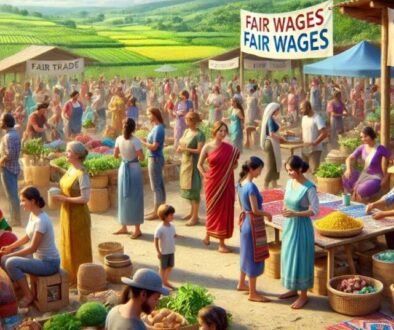Impact of Fair Trade Practices Around the World
There’s a ripple effect that occurs when you support fair trade practices – it’s not just about that single purchase you make. When you choose fair trade products, you are directly impacting communities around the world in a positive way. From ensuring fair wages and safe working conditions to promoting sustainable practices and empowering local artisans, your decision to support fair trade has far-reaching implications. Let’s investigate into how these practices are making a difference in the lives of people worldwide.
Key Takeaways:
- Empowering Communities: Fair trade practices empower communities by providing fair wages and fostering sustainable business practices.
- Promoting Social Justice: Fair trade supports social justice by ensuring workers are treated fairly and have access to safe working conditions.
- Environmental Sustainability: Fair trade practices promote environmental sustainability by encouraging eco-friendly production methods.
- Improving Quality of Life: Fair trade initiatives contribute to improving the quality of life for individuals in developing countries by enhancing access to education, healthcare, and other crucial services.
- Building Stronger Economies: Fair trade practices help build stronger local economies by providing stable income opportunities and supporting small-scale producers.
The History of Fair Trade
Origins and Evolution
For centuries, the concept of fair trade has been rooted in the idea of ensuring that producers receive fair compensation for their goods. The modern fair trade movement, as we know it today, began in the mid-20th century, aiming to address the economic disparities faced by producers in developing countries. By employing more equitable trading practices, fair trade seeks to empower marginalized communities and improve their living standards.
Key Milestones and Events
History has seen significant milestones in the fair trade movement. The 1960s marked the establishment of the first fair trade organizations, advocating for social and economic justice in trade. Fast forward to the 21st century, and fair trade certifications have become more prevalent, helping consumers identify products that adhere to fair trade principles.
With an increasing awareness about the ethical implications of consumer choices, the demand for fair trade products has grown substantially. This surge in consumer interest has propelled the fair trade movement forward, making it a powerful force for positive change in communities around the world.
Principles of Fair Trade
Fair Prices and Wages
Any ethical business practice involves ensuring fair prices and wages for the producers and workers involved in the supply chain. On an individual level, fair prices enable the producers to cover their production costs and earn a sustainable livelihood, while fair wages ensure that workers are paid fairly for their labor.
By supporting fair prices and wages through fair trade practices, you can directly contribute to uplifting communities around the world, providing them with the financial stability and resources needed to thrive.
Decent Working Conditions
On the foundation of fair prices and wages lies the importance of decent working conditions. Fair trade practices advocate for safe and healthy working environments, reasonable working hours, and the prohibition of child labor and forced labor.
By prioritizing decent working conditions, fair trade organizations prioritize the well-being of their workers, fostering a culture of respect, dignity, and equality within the workplace.
Wages are not just about monetary compensation; they also reflect the value and respect given to workers for their contributions. Fair trade practices emphasize the significance of fair wages in recognizing the inherent dignity and worth of every individual involved in the production process.
Community Development and Social Responsibility
Trade is more than just the exchange of goods and services—it is a powerful tool for community development and social responsibility. Fair trade practices promote sustainable development by reinvesting profits into community projects that enhance education, healthcare, and infrastructure.
Fair trade goes beyond economic transactions; it embodies a commitment to social responsibility by empowering communities to build a better future for themselves. By supporting fair trade initiatives, you actively participate in creating positive social change and fostering inclusive growth worldwide.
Economic Impact of Fair Trade
Despite the challenges faced by communities across the globe, fair trade practices have played a significant role in improving economic conditions. The economic impact of fair trade can be seen in various aspects of community development, from increased income and livelihoods to improved productivity and access to new markets.
Increased Income and Livelihoods
An important benefit of fair trade practices is the increase in income and livelihood opportunities for individuals in marginalized communities. By ensuring fair wages and working conditions for producers, fair trade initiatives empower workers to improve their standard of living and provide better opportunities for themselves and their families.
Improved Productivity and Efficiency
For communities engaged in fair trade practices, improved productivity and efficiency are key outcomes. By implementing sustainable farming techniques and investing in skills training, producers can enhance the quality and quantity of their products. This not only benefits the community economically but also creates a more sustainable environment for future generations.
Improved productivity and efficiency also lead to cost savings for producers, allowing them to allocate resources more effectively and potentially expand their operations. This cycle of continuous improvement helps communities build resilience and thrive in the long term.
Access to New Markets and Opportunities
Opportunities for growth and diversification are vital for the economic development of communities around the world. Fair trade practices enable producers to access new markets and opportunities that may not have been available to them otherwise. By connecting with ethical buyers and organizations, communities can expand their reach and make their products more competitive in the global marketplace.
The ability to access new markets opens up a world of possibilities for communities, providing them with the chance to showcase their unique products and skills to a broader audience. This exposure not only boosts economic growth but also fosters cultural exchange and understanding between different regions.
Social Impact of Fair Trade
Unlike conventional trade practices, fair trade initiatives prioritize the well-being of small-scale farmers and producers.
Empowerment of Small-Scale Farmers and Producers
With fair trade, you are directly contributing to empowering small-scale farmers and producers by providing them with fair wages, stable prices, and access to global markets. This empowerment enables them to improve their living conditions, invest in sustainable farming practices, and gain control over their economic futures.
Improved Health and Education Outcomes
Social impact is a key aspect of fair trade, as it focuses on improving the overall well-being of communities. By supporting fair trade products, you are indirectly promoting better health and education outcomes for producers and their families. Fair trade standards often include provisions for safe working conditions, access to healthcare, and educational opportunities for children, leading to healthier and more educated communities.
Enhanced Community Cohesion and Social Capital
Trade under fair practices fosters enhanced community cohesion and social capital. When you choose fair trade products, you are contributing to building strong and supportive communities. Fair trade encourages collaboration, mutual support, and collective decision-making, which can strengthen social ties and create a sense of belonging among community members.
Health and education are imperative components of fair trade’s social impact. By prioritizing the well-being of producers and their families, fair trade practices contribute to creating healthier and more educated communities. Fair trade initiatives often involve partnerships with local organizations to provide access to healthcare services and educational opportunities, ensuring that community members can lead healthier and more fulfilling lives.
Fair Trade Practices
Fair trade practices not only benefit individual producers but also have a positive impact on the overall community. Enhanced community cohesion and social capital are key outcomes of fair trade, as they promote solidarity, trust, and cooperation among community members. By supporting fair trade, you are actively contributing to the development of resilient and close-knit communities that prioritize the well-being of all individuals.
Environmental Impact of Fair Trade
For communities around the world, the environmental impact of fair trade practices is significant. By promoting sustainable agricultural practices, reducing carbon footprint and waste, and conserving natural resources, fair trade initiatives play a crucial role in fostering environmental stewardship.
Sustainable Agricultural Practices
Any time you purchase a fair trade product, you are supporting farmers who adhere to sustainable agricultural practices. These practices focus on maintaining the health of the land, promoting biodiversity, and minimizing the use of harmful chemicals. By investing in fair trade products, you are contributing to a more sustainable future for our planet.
Reduced Carbon Footprint and Waste
Reduced When you choose fair trade products, you are also helping to reduce carbon footprint and waste. Fair trade emphasizes eco-friendly production methods and packaging, which leads to lower carbon emissions and less waste in landfills. By making conscious choices as a consumer, you can make a positive impact on the environment.
Conservation of Natural Resources
Impact Fair trade practices prioritize the conservation of natural resources such as water, soil, and forests. Farmers who participate in fair trade are encouraged to implement resource-efficient techniques that minimize waste and protect the environment. By supporting fair trade, you are contributing to the preservation of our planet’s precious resources for future generations.
Challenges and Limitations of Fair Trade
Once again, while Fair Trade practices aim to bring about positive change in communities worldwide, there are several challenges and limitations that can hinder their effectiveness in achieving sustainable development goals. These challenges often stem from issues related to certification and labeling, market volatility, and balancing competing interests and priorities.
Certification and Labeling Issues
On the journey to promote Fair Trade, one major challenge is ensuring that products meet the specific criteria set for certification. While having a Fair Trade label signifies that certain standards have been met, the certification process itself can be complex and expensive for producers, especially small-scale farmers and artisans in developing countries. This can sometimes exclude them from participating in the Fair Trade market due to the financial burden of obtaining certification.
Market Volatility and Price Fluctuations
Volatility in global markets can significantly impact Fair Trade producers, leading to unpredictable income and financial instability. Fluctuations in prices of commodities such as coffee, cocoa, and cotton can affect the revenue earned by producers, making it challenging for them to plan for the future and invest in their communities. Additionally, market volatility can undermine the stability and sustainability of Fair Trade initiatives, posing a risk to the long-term well-being of those involved in the supply chain.
A key concern related to market volatility is the vulnerability of small-scale farmers and producers to external factors such as climate change, political instability, and economic crises. These external forces can exacerbate the challenges faced by Fair Trade participants, making it necessary for organizations and consumers to consider ways to mitigate the risks posed by market fluctuations.
Balancing Competing Interests and Priorities
An necessary aspect of Fair Trade is balancing the interests and priorities of various stakeholders involved in the supply chain. Producers, consumers, businesses, and advocacy groups may have conflicting objectives, making it challenging to create inclusive and sustainable Fair Trade practices that benefit all parties. Finding a harmonious balance between economic viability, social responsibility, and environmental sustainability is crucial for the long-term success of Fair Trade initiatives.
For instance, striking a balance between fair wages for producers and affordable prices for consumers can be a delicate task, requiring transparent communication and mutual understanding among all stakeholders. By addressing competing interests and priorities thoughtfully, Fair Trade can continue to promote ethical principles and positive social impact in communities around the world.
The (Positive) Impact of Fair Trade Practices
From reading this article, it should be clear that fair trade practices have a significant impact on communities around the world. By ensuring fair wages, safe working conditions, and environmental sustainability, fair trade empowers communities to improve their quality of life and break the cycle of poverty. When you support fair trade products, you are contributing to a more equitable global economy and making a positive difference in the lives of individuals and families in developing countries.
As you continue to make conscious choices in your purchasing decisions, remember the power you hold to support fair trade practices and advocate for social and environmental justice. Your actions have ripple effects that reach far beyond your own community, creating a more sustainable and equitable world for all. Together, we can work towards a future where fairness and equality are at the core of our global economy.
FAQ
Q: What is Fair Trade and how does it impact communities around the world?
A: Fair Trade is a trading partnership based on transparency, respect, and equity. It seeks greater equity in international trade by paying fair prices to producers in developing countries. This practice positively impacts communities by improving living and working conditions, empowering farmers and workers, and promoting sustainability.
Q: How does Fair Trade benefit producers and workers in developing countries?
A: Fair Trade ensures producers and workers receive fair wages for their products and labor, providing them with the means to invest in their businesses, communities, and personal development. This economic stability improves their livelihoods and quality of life.
Q: Does Fair Trade have environmental benefits for communities around the world?
A: Yes, Fair Trade practices encourage sustainability by promoting environmentally friendly farming and production methods. This benefits communities by preserving natural resources, reducing pollution, and supporting biodiversity conservation.
Q: How does Fair Trade empower women and marginalized groups in communities?
A: Fair Trade principles promote gender equality and social inclusivity by ensuring fair treatment and opportunities for women and marginalized groups. This empowerment leads to greater participation in decision-making processes and increased access to education and healthcare.
Q: How can consumers support the impact of Fair Trade practices on communities around the world?
A: Consumers can support Fair Trade by choosing products with Fair Trade certification, educating themselves and others about Fair Trade principles, and advocating for fair and ethical trade practices. By making conscious purchasing decisions, consumers can help create positive change for communities worldwide.










